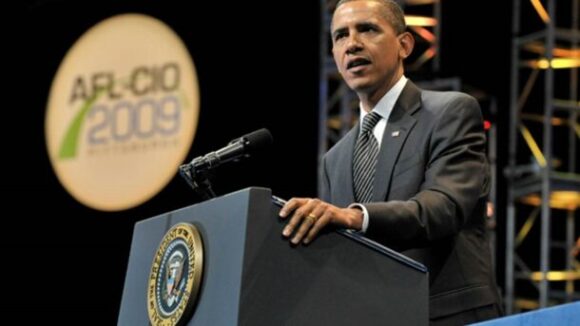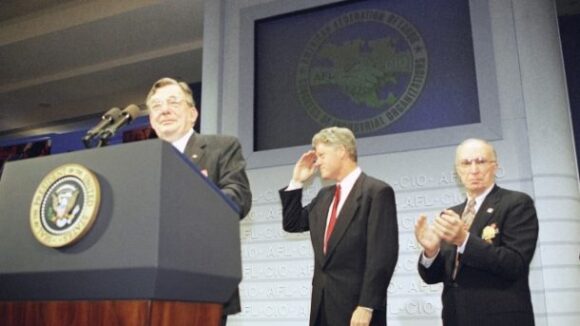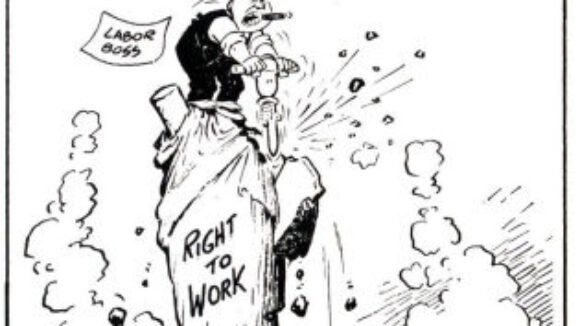‘America’s Most Pro-Union Boss President Ever’
"Joe Biden seems destined to go down in history as America’s most pro-union boss President ever..." - Mark Mix

"Joe Biden seems destined to go down in history as America’s most pro-union boss President ever..." - Mark Mix

Judge: Rule Appears to Conflict With U.S. Code’s ‘Plain Language’ (download the September 2016 NRTWC Newsletter) This summer, federal judges in courts located more than 1,100 miles from one another sharply chastised Obama-appointed U.S. Labor Secretary Tom Perez for attempting,…

In 1993 and 1994, then-AFL-CIO President Lane Kirkland (left) and President Bill Clinton (center) tried and tried to ram the Pushbutton Strike Bill through the U.S. Congress. Because of intense public opposition, largely mobilized by the National Right to Work…

J. Davitt McAteer, former United Mine Workers official and former Bill Clinton appointee as Asst. Sec. Mine Safety and Health Administration (MSHA), has allegedly stolen from taxpayers. Forced-unionism proponents, such as the United Mine Workers of America, supported his tenure…

Jeff Jacoby, a columnist for The Boston Globe, blasts Big Labor's "shameless pretext" for fighting without abandon against Right To Work Freedom: SOON -- PERHAPS AS EARLY AS TODAY -- Gov. Mitch Daniels will sign legislation making Indiana the nation's 23rd right-to-work state. Labor unions angrily oppose the change, but their opposition has no legitimate or principled basis. State right-to-work laws, authorized by the Taft-Hartley Act of 1947, are not anti-union. They are pro-choice: They protect workers from being forced to join or pay fees to a labor union as a condition of keeping a job. In non-right-to-work states, employees who work in a "union shop" are compelled to fork over part of each paycheck to a labor organization -- even if they want nothing to do with unions, let alone to be represented by one. Laws like the one Indiana is poised to enact simply make union support voluntary. Hoosiers can't be required to kick back part of their wages to the Republican Party or the Methodist Church or the Animal Liberation Front; the new measure will ensure that they don't have to give a cut of everything they earn to labor unions, either. Most Americans regard compulsory unionism as unconscionable. In a new Rasmussen survey, 74 percent of likely voters say non-union workers should not have to pay dues against their will. Once upon a time, labor movement giants like Samuel Gompers, a founder of the American Federation of Labor, agreed. "I want to urge devotion to the fundamentals of human liberty -- the principles of voluntarism," declared Gompers in his last speech to the AFL in 1924. "No lasting gain has ever come from compulsion." Those words can be seen chiseled on Gompers's memorial in Washington, DC. So as a matter of by-any-means-necessary expediency, it is easy to understand why Big Labor long ago embraced what liberal scholar Robert Reich (who served as Bill Clinton's secretary of labor) dubbed "the necessity for coercion." In order "to maintain themselves," Reich said in 1985, "unions have got to have some ability to strap their members to the mast." Or, as Don Corleone might have put it, to make them an offer they can't refuse. But is there any ethical reason -- any honorable basis -- for the union shop?

Jeff Jacoby, a columnist for The Boston Globe, blasts Big Labor's "shameless pretext" for fighting without abandon against Right To Work Freedom: SOON -- PERHAPS AS EARLY AS TODAY -- Gov. Mitch Daniels will sign legislation making Indiana the nation's 23rd right-to-work state. Labor unions angrily oppose the change, but their opposition has no legitimate or principled basis. State right-to-work laws, authorized by the Taft-Hartley Act of 1947, are not anti-union. They are pro-choice: They protect workers from being forced to join or pay fees to a labor union as a condition of keeping a job. In non-right-to-work states, employees who work in a "union shop" are compelled to fork over part of each paycheck to a labor organization -- even if they want nothing to do with unions, let alone to be represented by one. Laws like the one Indiana is poised to enact simply make union support voluntary. Hoosiers can't be required to kick back part of their wages to the Republican Party or the Methodist Church or the Animal Liberation Front; the new measure will ensure that they don't have to give a cut of everything they earn to labor unions, either. Most Americans regard compulsory unionism as unconscionable. In a new Rasmussen survey, 74 percent of likely voters say non-union workers should not have to pay dues against their will. Once upon a time, labor movement giants like Samuel Gompers, a founder of the American Federation of Labor, agreed. "I want to urge devotion to the fundamentals of human liberty -- the principles of voluntarism," declared Gompers in his last speech to the AFL in 1924. "No lasting gain has ever come from compulsion." Those words can be seen chiseled on Gompers's memorial in Washington, DC. So as a matter of by-any-means-necessary expediency, it is easy to understand why Big Labor long ago embraced what liberal scholar Robert Reich (who served as Bill Clinton's secretary of labor) dubbed "the necessity for coercion." In order "to maintain themselves," Reich said in 1985, "unions have got to have some ability to strap their members to the mast." Or, as Don Corleone might have put it, to make them an offer they can't refuse. But is there any ethical reason -- any honorable basis -- for the union shop?

E-mails Reveal Why Top NLRB Lawyer 'Screwed up the U.S. Economy' Internal NLRB e-mails show Lafe Solomon (pictured) was disinclined this March to target Boeing for expanding production in Right to Work South Carolina. Then IAM union chiefs, led by Tom Buffenbarger, apparently got to him. Credit: AP/Bruce Smith (Source: November-December 2011 National Right to Work Committee Newsletter) This April 20, Acting National Labor Relations Board (NLRB) General Counsel Lafe Solomon ignited a public-policy firestorm by filing a complaint against Boeing for initiating a second Dreamliner 787 aircraft production line in Right to Work South Carolina. In several public statements, Boeing executives had made no bones about the fact that their decision to expand in a Right to Work state was prompted largely by their desire to avoid or at least mitigate multi-billion-dollar revenue losses stemming from disruptive strikes. Agreeing with International Association of Machinists (IAM/AFL-CIO) union kingpins who had repeatedly ordered employees at Boeing's west coast facilities out on strike, Mr. Solomon claimed these statements showed Boeing was motivated by "anti-union animus." Consequently, the South Carolina expansion was illegal, declared Mr. Solomon. Mr. Solomon's complaint asked an NLRB administrative law judge to stop Boeing's South Carolina production. Former Clinton-Appointed NLRB Chairman: Boeing Complaint Didn't 'Make Sense'

E-mails Reveal Why Top NLRB Lawyer 'Screwed up the U.S. Economy' Internal NLRB e-mails show Lafe Solomon (pictured) was disinclined this March to target Boeing for expanding production in Right to Work South Carolina. Then IAM union chiefs, led by Tom Buffenbarger, apparently got to him. Credit: AP/Bruce Smith (Source: November-December 2011 National Right to Work Committee Newsletter) This April 20, Acting National Labor Relations Board (NLRB) General Counsel Lafe Solomon ignited a public-policy firestorm by filing a complaint against Boeing for initiating a second Dreamliner 787 aircraft production line in Right to Work South Carolina. In several public statements, Boeing executives had made no bones about the fact that their decision to expand in a Right to Work state was prompted largely by their desire to avoid or at least mitigate multi-billion-dollar revenue losses stemming from disruptive strikes. Agreeing with International Association of Machinists (IAM/AFL-CIO) union kingpins who had repeatedly ordered employees at Boeing's west coast facilities out on strike, Mr. Solomon claimed these statements showed Boeing was motivated by "anti-union animus." Consequently, the South Carolina expansion was illegal, declared Mr. Solomon. Mr. Solomon's complaint asked an NLRB administrative law judge to stop Boeing's South Carolina production. Former Clinton-Appointed NLRB Chairman: Boeing Complaint Didn't 'Make Sense'
The NLRB’s action against South Carolina Boeing employees is mystifying even to a former NLRB Board member appointed by pro-Big Labor President Bill Clinton. Bill Gould, a Clinton Administration Board member is “mystified” by the NLRB’s actions. “The Boeing case is…